#french version propaganda
Text
Unpopular opinion: does anyone else just fucking hate the 1985 original London recording of Les miserables or is it just me?? I'll give my propaganda reasoning below, give that a read first:
Okay, my reasoning:
OBVIOUSLY Colm Wilkinson is incredible. Not disputing that. So slightly remove that from the equation when I say I don't like this recording. Of course, a lot of the singers are really great (specifically Marius, Eponine, Cosette, jvj, fantine, Enjolras, loads of the Amis), and there are some songs that I like, but as a whole it feels really clunky.
In terms of timing, I know it was more of a concept album for England and they obviously changed a lot of bits afterwards, but in the recording it feels like all of the singers are very unsure of the timings. Whether this is because they actually were or because of artistic decisions to phrase things strangely, in the listening experience, it really comes across with an uncertain feel. Nothing seems to come in quite at the right time, and a lot of the singers will be just a couple of beats delayed in their coming in, which they may have been instructed to do by the musical director, but it feels strange all the same. And a lot of the singers play around with the timings so much that it feels at odds with the accompaniment.
Second, this is gonna be an insanely unpopular opinion, but I think Roger Allam in this specific recording (not commenting on his performance live) is a bit abysmal. He's an insanely talented actor and I love him in the thick of it, but here he does not show off his ability as a singer well at all. He speaks most of the lines, which is fine for some songs but feels awkward when he's really baring his soul in the soliloquy. Also his technique as a singer is really questionable. The way he holds his consonants completely restricts his vocals, giving it no vib and no room to grow especially on the big notes, it does not do justice to the build of the music. Furthermore, I feel he skims over the tops of the notes a lot, which really pisses me off because in a piece of music so carefully curated like Les miserables, every note is important to the flow and the harmony. This is not to slag him off. I'm sure he was good in performance, but I feel this specific recording does not reflect that.
Musically, they don't go ham with the drums enough. If you want to understand what I mean, just listen to the french version. Also, the music in this version, again, feels a little uncertain. Like there are points where a couple of instruments are playing a melody, and theres a countermelody that doesn't really sound like it fits. And you know it just needs a third harmony to bring it all together. It's just little things that make it sound less refined as a whole. (Side note but this pisses me off: a lot of the time the songs are a lot slower in tempo than all the other recordings and it just feels like it lacks energy a bit)
Propaganda time: The main reason I don't like this one is because it's not as good as the french version, which feels consistently refined and energised and raw. The emotion comes through from all of the singers so much more, without losing track of the notes or the rhythms. All the singers have wonderful technique, specifically jvj and Javert, which makes their songs so much more powerful. Just listen to Comment faire? (Same as Who am I) and youll get what I mean about the drums and the countermelodies. Also they have some baller theme and variation in that song which really brings out the music student in me.
Conclusion: I'm absolutely so sorry if I've just ripped apart your favourite recording. Do feel free to ignore everything I've just said because most of these are just like teeny tiny little things that annoy me specifically. And I'm sure most of this is just because I've spent too much time listening to the french version that now I turn my nose up at perfectly respectable other versions. If you love this one, you're valid. And I do listen to some of the songs on it. I love their little fall of rain and finale. I just can't stand roger allam's soliloquy or stars.
#les miserables#les mis#sorry again if you feel ive been harsh#i just cant bloody stand it#victor hugo#les misposting#original 1985 recording#jean valjean#javert#propaganda#french version propaganda
22 notes
·
View notes
Text
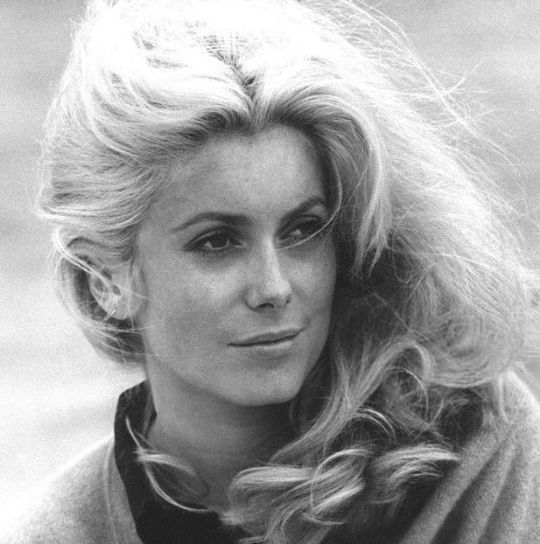
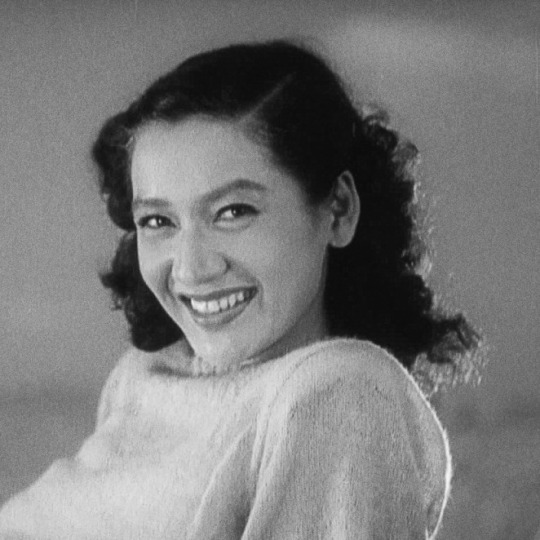
Propaganda
Catherine Deneuve (Belle de Jour, The Umbrellas of Cherbourg, The Young Girls of Rochefort)—Say what you will about the French but they really went off with Catherine Deneuve
Setsuko Hara (Tokyo Story, Late Spring, The Idiot)— "'The only time I saw Susan Sontag cry,' a writer once told me, his voice hushed, 'was at a screening of a Setsuko film.' What Setsuko had wasn’t glamour—she was just too sensible for that—it was glow, one that ebbed away and left you concerned, involved. You got the sense that this glow, like that of dawn, couldn’t be bought. But her smiles were human and held minute-long acts, ones with important intermissions. When she looked away, she absented herself; you felt that she’d dimmed a fire and clapped a lid on something about to spill. Over the last decade, whenever anyone brought up her lips—'Setsuko’s eternal smile,' critics said, that day we learned that she’d died—I thought instead of the thing she made us feel when she let it fall." - Moeko Fujii
This is round 3 of the tournament. All other polls in this bracket can be found here. Please reblog with further support of your beloved hot sexy vintage woman.
[additional propaganda submitted under the cut.]
Catherine Deneuve propaganda:

"One of the greatest european actresses of all time. Famous for portraying 'aloof and mysterious beauties', she could play both the innocent and adorable and the cold and erotic parts. She was so beautiful she was chosen to be the face of Marianne, France's national symbol."
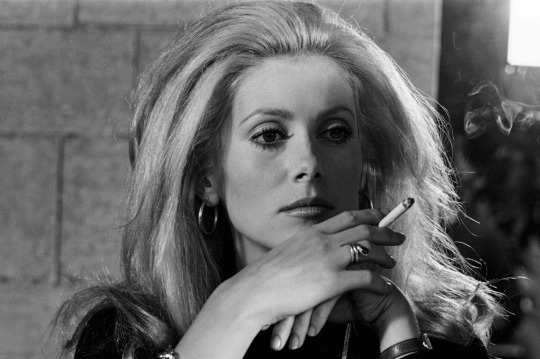

"She was a French movie star famous for icy and aloof roles and worked with some of the greatest international directors in the world (Jacques Demy, Luis Buñuel, and François Truffaut to name a few). She could kill you with her gaze and her bone structure should be studied by painters"
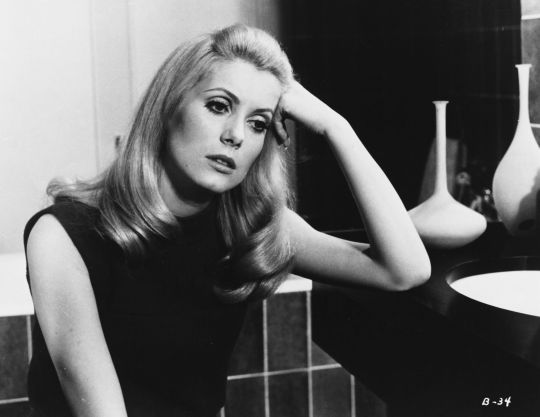
"One of the most famous of French actresses that has grace the film screen. She is just stunning and beautiful."
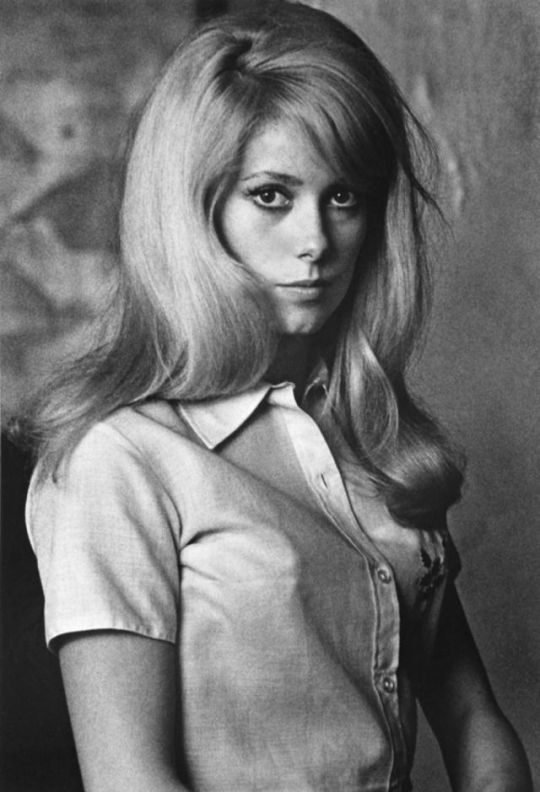
Setsuko Hara:

One of the best Japanese actresses of all time; a symbol of the golden era of Japanese cinema of the 1950s After seeing a Setsuko Hara film, the novelist Shūsaku Endō wrote: "We would sigh or let out a great breath from the depths of our hearts, for what we felt was precisely this: Can it be possible that there is such a woman in this world?"
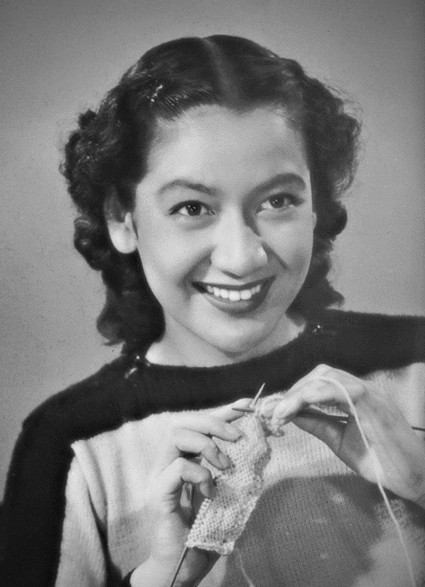

One of the greatest Japanese actresses of all time!! Best known for acting in many of Yasujiro Ozu's films of the 40s and 50s. Also she has a stunning smile and beautiful charm!

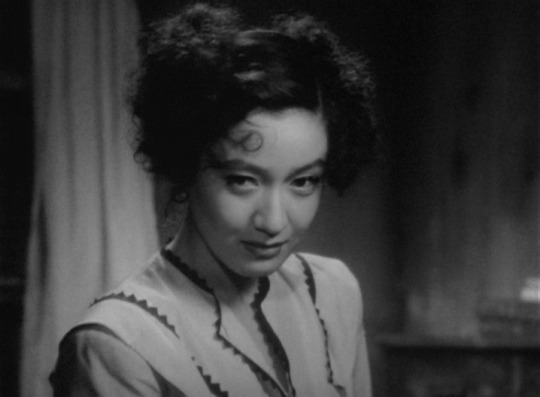
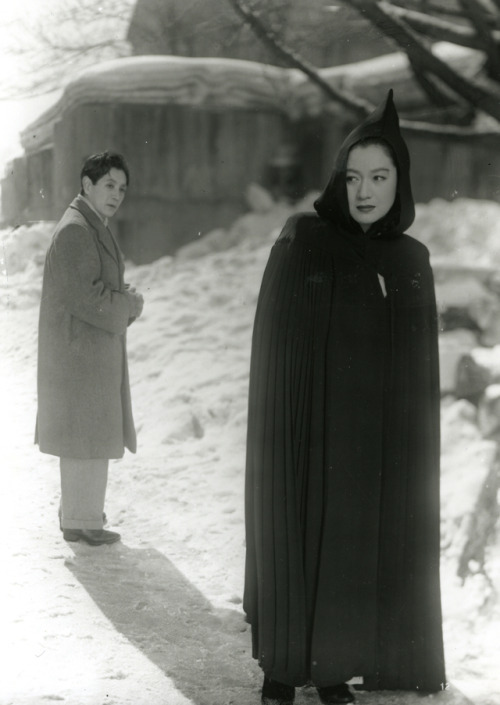
Linked gifset
Linked gifset 2

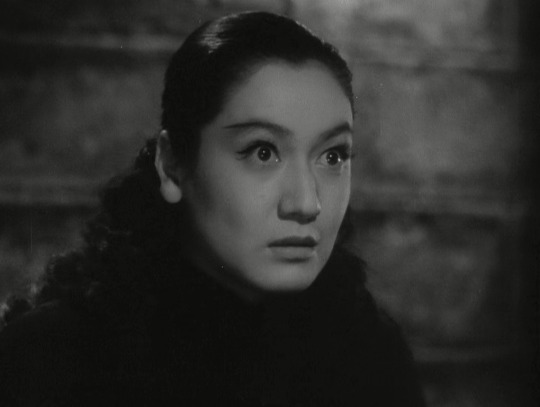

She's considered by some to be the greatest Japanese actress of all time! In Kurosawa's The Idiot she haunts the screen, and TOTALLY steals the show from Mifune every time she appears.

"No other actor has ever mastered the art of the smile to the same extent as Setsuko Hara (1920–2015), a celebrated star and highly regarded idol who was one of the outstanding actors of 40s and 50s Japanese cinema. Her radiant smile floods whole scenes and at times cautiously undermines the expectations made of her in coy, ironic fashion. Yet her smile's impressive range also encompasses its darker shades: Hara's delicate, dignified, melancholy smile with which she responds to disappointments, papers over the emotions churning under the surface, and flanks life's sobering realizations. Her smiles don't just function as a condensed version of her ever-precise, expressive, yet understated acting ability, they also allow the very essence of the films they appear in to shine through for a brief moment, often studies of the everyday, post-war dramas which revolve around the break-up of family structures or the failure of marriages. Her performances tread a fine line between social expectation and personal desire in post-war Japan, as Hara attempts to lay claim to the autonomy of the female characters she plays – frequently with a smile." [link]
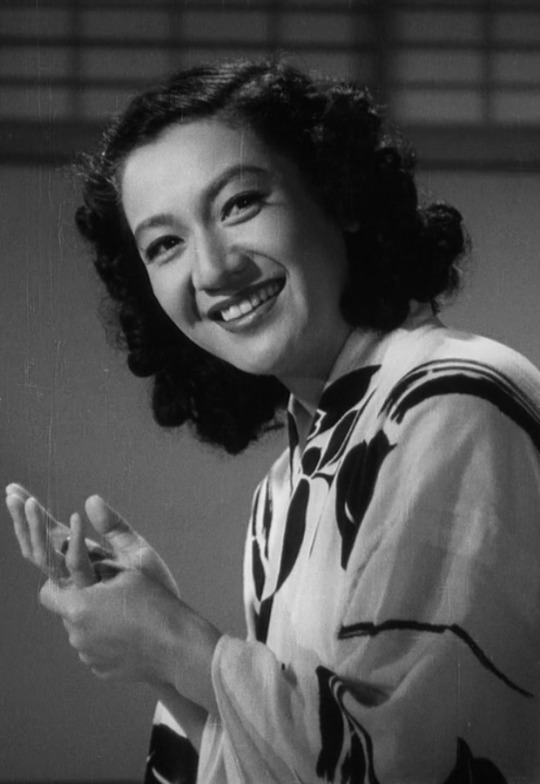
Leading lady of classic Japanese cinema with a million dollar smile
Maybe the most iconic Japanese actress ever? She rose to fame making films with Yasujiro Ozu, becoming one of the most well-known and beloved actresses in Japan, working from the 30s through the 60s in over 100 hundred. She is still considered one of the greatest Japanese actresses ever, and in my opinion, just one of the greatest actresses of all time. And she was HOT! Satoshi Kon's film Millennium Actress was largely based on her life and her career.
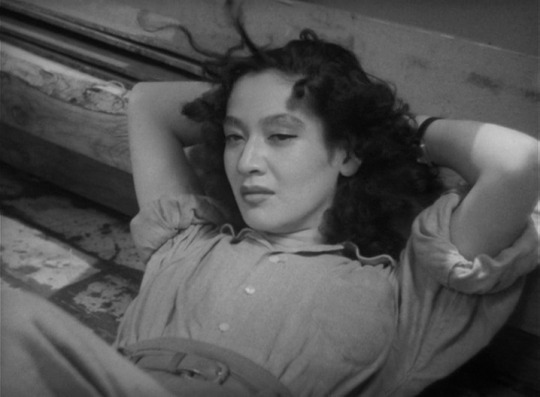
173 notes
·
View notes
Text
THE HOT MEDIEVAL & FANTASY MEN MELEE
QUALIFYING ROUND: 92nd Tilt
François Villon, If I Were King (1938)
VS.
Prince Prospero, The Masque of the Red Death (1964)


Propaganda
François Villon, If I Were King (1938)
Portrayed by: Ronald Colman
“The best-known French poet of the middle ages and also a thief, burglar and brawler who features in several different movies, plays and operettas as a folk hero who's granted the role of King For A Day by King Louis XI and ends up saving Paris from a siege. THE RONALD COLMAN VERSION IS HOT. He has charm, sass, over-knee suede boots and recites poetry frequently.”
Prince Prospero, The Masque of the Red Death (1964)
Portrayed by: Vincent Price
“Serving. Cunt. I mean when wasn't Vincent Price serving cunt? But he's serving MEDIEVAL, Devil-worshipping cunt in this movie. Oh, what? You need an innocent maiden to corrupt? Here! Take me instead!”
Additional Propaganda Under the Cut
Additional Propaganda
For François Villon:



For Prince Prospero:




#medieval hotties qualifiers#francois villon#prince prospero#if i were king#the masque of the red death#ronald colman#vincent price#fuck that medieval man
69 notes
·
View notes
Text
Daily update post:
Another one that I start with news of a terrorist attack. -_- This morning, a terrorist started shooting at several vehicles driving down the Jordan Valley, one of which was a school bus. The driver of this bus confirmed that the terrorist was wearing what looked like an IDF uniform. According to Magen David Adom (Red Star of David) there are at least 3 people injured, one is a 13 years old kid, another is in serious condition. The terrorist has not yet been neutralized.

After Amit Soussana's testimony about being raped by Hamas, we also have a Palestinian Islamic Jihad (PIJ) terrorist admitting during an interrogation that he had raped a woman in her home in an Israeli kibbutz. It's not the first such testimony, but these are important enough that when they're published, they ALL must be heard.
The prosecution against the terrorists responsible for the massacre of October 7 has been expanded to include clauses which could end with the death penalty (I found a link to a journalistic source online, then I accidentally closed that tab, and can't find it again, but it's been reported on TV. The following tweet recounts the indictments, though the headline is misleading. A death sentence has not been approved, it's just now approved that it's a possible outcome of the trials, once they take place).

For those unfamiliar with the Eurovision Song Contest, it's an event that has been run since 1956, with the intent to help heal a post-war Europe, by allowing countries to have a friendly competition (instead of a bloody conflict), and also have a chance to get to know each other better through music. It's meant to be a unifying, and therefore also a-political fun music fest. This contest has since been expanded to include all countries that are members of the European Broadcasting Union, which means Israel also gets to compete since 1973, and has even won 4 times. I wrote this post about our entry this year, if anyone's curious. In recent years, the ESC has been used for annual anti-Israel propaganda, way before the war in Gaza. This year, a senior official in Israel's National Security Office had to issue a warning for any Israelis going to the competition in Sweden, to be careful and hide their identity as much as possible. I am passing along the warning, because wherever Israelis are in danger, so are Jews in general.

After Canada, Sweden, Australia and Finland, now France is also declaring that it will fund UNRWA again, proving that no amount of complicity in anti-Jewish terrorism will stop some European countries from passing along money to those who have raped, maimed, tortured and murdered us. But no worries! France promises it will ensure that their money won't go to terrorism. I will just remind everyone that France brokered a "deal" to pass along medications to Israeli hostages with chronic illnesses in Gaza, in exchange for an additional 1,000 packages of meds for Gazans. It then said they got reassurance that the meds got to those hostages (meaning, France quoted Qatar, which quoted Hamas, so this is the international diplomacy version of, "Trust me, bro. I'm a highly reliable antisemitic terrorist"). When Israeli soldiers got to a hospital in Gaza, they found some of the med packages for the Israeli hostages in its pharmacy, unopened and clearly not delivered to the rightful address. So... IDK about you, but I'm pretty sure even the French know their assurances about the UNRWA funding are just empty words.

This is 40 years old Mohammad Alatrash.

He's an Israeli Bedouin Muslim Arab, and father of 13, including a one month old baby. He was kidnapped on Oct 7, and has been held captive in Gaza since. Mohammad's uncle said the whole family's life has not been normal since he was taken hostage. Despite that, today several families of hostages had a tour of the attacked communities in the south, with Israel's and Belgium's Foreign Ministers, his brother Salem said that they're okay with Mohammad being released later, as long as Hamas frees the female hostages. "It's hell what they're made to go through there." Just a reminder that Mohammad is one of the Israeli Muslim hostages that Hamas could have and chose not to release even during the month holy to all muslims, Ramadan.
(for all of my updates and ask replies regarding Israel, click here)
#israel#antisemitism#israeli#israel news#israel under attack#israel under fire#terrorism#anti terrorism#hamas#antisemitic#antisemites#jews#jew#judaism#jumblr#frumblr#jewish#israelunderattack#unrwa#un
93 notes
·
View notes
Text
Facts about comic!Natasha
She hates pancakes
Natalia is fluent in a variety of languages (including, Russian, English, German, French, Japenese and various others)
She is a very skilled acrobat, gymnast and aerialist
Logan is her father figure -> he also trained her
She has a cat, Liho
Natalia fought in WW II and the Cold War
She was born in 1928 and enhanced with a version of the super soldier serum
Natasha is a direct descandant of the House of Romanov and with that Russian Royalty
She's been dubbed the Red Death, Slavic Shadow, War Widow, Tsarina, the greatest killer to walk the earth at present and more
People didn't believe the Black Widow actually existed, they thought she was just some Soviet propaganda
Natalia doesn't use her Widow's Bite anymore
She's Russian Orthodox
Natasha has canonically kissed two women
She loves the rain
Elektra and Natasha don't get along
Also, her and Maria Hill hate each other
Though retconned, she has at least three older brothers (one of them tried to kill her)
Natalia has been killing people since she was ~7
She loved the other Widows and considered them her sisters (also mcu canon)
She was forced to kill her girlfriend childhood friend, Marina
Natasha was the first to get the title "Black Widow"
The headmistress, 'leader' of the Red Room, loved Natasha
She was the best student of the Red Room
StaIìn himself chose Natalia for the Red Room because of her surname (he thought it'd be funny and it would show the world something)




#marvel#black widow#marvel comics#natasha romanoff#natalia romanova#black widow comic#natasha romanov#natasha romonova#natalia alianovna romanova#mother#she is mother
43 notes
·
View notes
Note
Propaganda for Michel Ney:
This man. THIS MAN HAD SO MUCH CHARACTER. HE’S LITERALLY THE KIND OF MAN THAT INSPIRES GOOD FICTIONAL CHARACTERS NGL!! Since he’s up against a british person, here is a description of him by the Times of London:
“... his name rendered illustrious by 25 years of eminent services and brilliant exploits, was dear to the country, and even the enemies of France admired in him the character of the Great Captain. All allowed him to possess as much generosity of sentiment as bravery and skill at the head of armies. No trait of weakness, adulation or rapacity, had ever cast shade over his loyalty and military virtues. His sole defect seemed to be a certain vehemence of character and expression, which rendered him little suited to public affairs.”
And his death was so tragic. In Waterloo, he had made a fatal mistake with the cavalry, and he decides here that he will die. We don’t know exactly what happened here. Did he have so much PTSD from russia and years of war that he made such a stupid mistake (AA ALSO AFTER the disaster of russia campaign he isolated himself so much. Poor man🥺)? But one thing’s for sure, this man wasn’t a coward. The Bravest of the Brave was not a man who’d mess up in the war and just run away. On those grassy fields, Ney tried everything to get his men’s attention and when all hope seemed lost he shouted in the faces of the enemies “See how a marshal of France meets his death!” It seems in that moment his greatest want was to be killed by english bullets. But Victor Hugo recounts this and adds the ironic line of “Unhappy man, thou wert reserved for French bullets!”
…😭😭😭😭ISN’T THAT JUST…. SO POETIC AND TRAGIC?????
AND DON’T EVEN. DONT EVEN GET ME STARTED ON HOW HE DIED!!!!
This man sobs afterwords he gets tried for treason against france basically for siding with Napoleon. But with how unfairly they zero-in on ney’s wrong doings, this was a blood sacrifice. To help him, his lawyer reasoned that the place Ney was born from technically was no longer french, since it has been annexed by Prussia from the 1815 treaty of paris…
But this guy. OH nOnoNonononononoNO, this red-haired, lion-looking, emotional honor-filled patriot has the audacity to interrupt his defender and say loudly without the slightest doubt or hesitation "I am French and I will remain French!"
….
Come on. COME ON!!!! How stupid is he???!! How idiotic!! He just closed another door to survival because of what??
because of honor….. Wow, can you imagine that? He has given everything all his years of service, all his years of being a husband, a father, a son, all his years of rest and peace of mind to France. He has done so much, and even when…EVEN WHEN FRANCE SLAPS HIM ACROSS THE FACE AND SAYS “you traitor” He shouts back “I am French and I will remain French!” aaaaaaAAAAAAAAAAAAAAAA OMG….. what the hek…who is this man????
So he is executed as a traitor. There are different versions of his death but here are a few:
By Rochechouart:
“He [Ney], of course, refused to kneel down and be blind-folded; he merely asked the Commandant Saint-Bias to show him where he should stand. He stood facing the platoon, who held their guns ready to fire. Then, in an attitude I shall never forget, it was so noble, calm and dignified, without bravado, he took off his hat, and availing himself of the moment when the Adjutant stepped aside and gave the signal to fire, he said these words, which I distinctly heard: Frenchmen, I protest against my sentence; my honour..." As he said these words he placed his hand on his heart; the volley was fired, and he fell. A rolling of drums, and the shout of "Vive le Roi" from the surrounding troops closed the mournful ceremony.”
Such a death made a deep impression on me, and turning to Auguste de la Rochejaquelein, Colonel of the Grenadiers, who was beside me, and who, like me, deplored the death of the bravest of the brave, I said: ‘There, my dear friend, is a lesson how to die.’”
By M. Laisne:
“He [Ney] took some steps, removed his hat, and in a loud and clear voice: ‘I protest,’ he said ‘before heaven and mankind, that the judgment that condemns me is iniquitous; I appeal from it to Europe and to posterity’ …. Before these words there was presented to him a handkerchief to bandage his eyes. He answered with exaltation, ‘do you not know that a soldier does not fear death.’ He advanced again four paces, laying his hand on his heart and said to the soldiers: ‘Do your duty. It is there that you must hit, do not miss me.’ Instantly he fell dead.”
And finally a very close person to him, Ida Saint-Elme:
“Ney got out of the carriage. He was wearing civilian clothes: a long dark coat, a white necktie, black breeches and stockings, a tall beaver hat with curved brim. He uncovered. His slightly raised head showed that his face wore a tranquil expression. He looked first to the right and then to the left. He caught sight of me. Then, as though fearing to compromise his faithful friends by the least sign of recognition, he bent his brow downward a trifle.”
“He walked on with firm step. At that instant I discerned through the mist, in the centre of the square of troops, and standing out from the dark background of the wall, the firing squad. I tried to rush forward. Belloc pulled me back, and forced me into the cab.”
“Then I dropped weakly upon the seat. A few minutes elapsed, each a whole century long. Then I heard a sharp report. I went into a dead faint."
His death is so tragic and amazing. It really shows out his character and was the initial thing that got me interested in him as a person. Anyways, basically, this dude is such a tragic glory-lover but also very heroic and inspiring.
So therefore HE ISS SEXY GO VOTE FOR NEY!!!
.
27 notes
·
View notes
Text
From hubris to debris: "Look on my works, ye mighty, and despair!"
This mboi to frev tumblrs. It was news to me! Taken from https://bestencyclopedia.com/Robespierre_Monument
Robespierre's self-destructing monument

Robespierre's statue being unveiled in Moscow, on 3 November 1918.
The Robespierre Monument (Памятник Робеспьеру) was one of the first monuments erected in the Russian Soviet Federative Socialist Republic (later part of the Soviet Union), raised in Moscow on 3 November 1918 – just ahead of the first anniversary of the October Revolution, which had brought the Bolsheviks to power.
Located in Alexander Garden, it was designed by the sculptor Beatrice Yuryevna Sandomierz. Created as part of the "monumental propaganda" plan, the monument was commissioned by Vladimir Lenin, who in an edict referred to Robespierre as a "Bolshevik avant la lettre". It was only one of several planned statues depicting French revolutionaries – others were to be made of Georges Danton, François-Noël Babeuf and Jean-Paul Marat, although only the one of Danton was ever completed.
Created in the context of the ongoing Russian Civil War and with the country in a state of war communism, there were few materials available to make the statue. Lacking bronze or marble, the monument was constructed using concrete, with hollow pipes running through it. This design proved frail, lasting only a few days. On the morning of 7 November only a pile of rubble remained. Over the following days different newspapers supplied varying versions as to why it collapsed, with Znamya Trudovoi Kommuny and others saying it was the work of "criminal" (counter-revolutionary) hands, and Izvestia stating the statue's demise was caused by improper construction.
#frev#robespierre#monuments#french revolution#russian revolution#Shelley#Ozymandias#what happened to Marat's statue?#Danton!
25 notes
·
View notes
Text
Der Adler.



These are some facts and curiosities about '' Der Adler'' a a biweekly Nazi propaganda magazine concerning the Luftwaffe:
The first issue was on March 1, 1939, on the initiative of the Reich Minister of Aviation to spread news regarding the Luftwaffle.
The contents were largely derived from material made available by the propaganda ministry with the aim of attracting German youth to enlist in the Wehrmacht.
The periodicity of the magazine was one issue every 14 days, the publication included 32 illustrated pages. In 1941 and 1942 the magazine came out with a reduced number of pages (halved, only 16 pages).
The first issues were published in bilingual format (English and German). At the outbreak of war, the two languages were separated and two separate releases were published. With the occupation of France, the third version was added, the one in French. The versions in Italian (1942/43), Spanish and Romanian also followed.
With the entry of the United States into the war, the price indication USA 8 Cent was removed from the cover, although the English version of the magazine continued to appear.
The French and English versions ended in 1944, in particular the English one ran until August of that year. The German edition, although difficult to find, continued in a limited context until February 1945.
A total of 146 issues were published in Germany
In the last official issue, released on 12 September 1944, it is announced, in greeting and thanks to the readers, the interruption of printing for the entire duration of the war, with the intention of dedicating all the resources involved to the army and the production. and the resumption of publications after the victory.
If you don't like it go with your life :))
Sources:
Wikipedia: Der Adler.
I DON'T SUPPORT NAZISM,FASCISM OR ZIONISM IN ANY WAY, THIS IS JUST AN EDUCATIONAL POST
74 notes
·
View notes
Note
Saw a thing that made me think of you for some reason. Gonna paste the entire reddit post here rather than link it, because you need to read in real time for the funny:
"My (31M) wife (32F) and I are in a healthy and happy relationship. That said, we’ve been together since high school, so we both feel that we missed out a little by being each others’ only sexual experiences. We’ve talked about this at length and decided a few years ago that we’re ok with having a few hall passes in our relationship, since we very much intend to stay together the rest of our lives and don’t want any resentment over missed possibilites. Plus it’s pretty rare that we could even find such an opportunity, as it’s a little hard to find hookups when you’re in a committed marriage and don’t go out much. We even gave each other advance approval in case a situation arises, so long as we’re safe about it and tell each other immediately afterward. We’ve both used one HP, each with someone we knew well enough but would never see again, and no issues came out of it. In fact, it’s only made us more secure in our relationship and how much we genuinely appreciate being with each other.
Recently, I had to travel to London for work. I don’t normally get to travel for work, so I decided to make a trip out of it and spend a few extra days of my own time in the city after the project was done. My wife couldn’t join because she didn’t have any vacation time left but was very supportive of me taking some time to explore since I’ve never been to London and she has. Being cheap, and being a pretty outgoing guy when I’m so inclined, I decided to stay in a hostel. I was interested in meeting other travelers since I didn’t know anyone in the city and love being sociable with new people. I chatted with several of the people staying there, and in particular a very attractive French girl (mid-20’s) who dressed super goth.
For context, I love the goth girl look. I’ve been sucked into the goth gf propaganda online, much to the annoyance of my wife. It isn’t her style, but she has been nice enough to cater to me by putting on a sexy goth outfit on occasion, since she’s knows it’s a huge fantasy of mine. Still, I pester her constantly to be more goth because I enjoy it so much.
Anyway, I ended up spending a little bit of time with goth French baddie - we both went to the hostel’s happy hour event and hit it off there. I found out that she was recently single and was in London for an art show. It turned out we were both into emo music, and we talked about our favorite bands. I had the thought that she was acting a bit flirty towards me, but didn’t think too much of it, until I later found myself sharing a sink with her in the hostel bathroom.
The hostel was co-ed, so each floor had a small shared bathroom with a communal sink, and a door that was meant to be kept open but which people frequently closed for the sake of having more privacy than just a stall to shower in. So I’m brushing my teeth while chatting up the real-life version of Shadowheart (who, mind you, is wearing an extremely low cut top), when she suddenly closes the bathroom door behind us. In my mind, my wildest fantasy is about to come true. It’s even more exciting because of the adrenaline rush of being in a semi-public setting, and a girl being so into me that she would make such a bold move. I can’t believe this is actually happening to me. I instantly get hard. Then she turns around and asks “Are you interested in learning about our lord and savior Jesus Christ?”
She had me cornered for 10 minutes trying to talk me into salvation, while I grew increasingly despondent and immensely disappointed, with the whiplash of going from what could’ve been one of the crowning moments of my life, to pure and utter dejection.
When I told my wife this story, she laughed for a solid hour. She said it’s karma for annoying her about wanting a goth gf.
TL;DR life dream was to bang a hot goth girl. Thought I was getting the opportunity, but got cockblocked by Jesus Christ. god is real and he hates me."
The fucking mood whiplash. I was reading this nodding along like okay yeah I guess that could be us in like 10 or 15 years, who knows, neither me nor my girl are the jealous type or anything, and then it fucking struck. The christians have weaponized goth girls. Fucking lost it laughing, it's been a rough 24 hours, thank you.
19 notes
·
View notes
Note
wth is red scare les mis
Have you ever wondered why all the nonmusical English-language Les Mis adaptations suck? Why they're so weirdly conservative? Why they all share the same dumb changes to the book like "Cops are fine but Javert is the One Bad Apple who's evil because he's obsessed with Valjean?" A lot of that can be traced back to one early influential American film adaptation of Les Mis-- Les Mis 1935, made during the height of the Red Scare, which my discord buddies and I have nicknamed "Red Scare Les Mis" or "Hays Code Les Mis."
Red Scare Les Mis was the first big-budget film adaptation of Les Mis in the English-speaking world. It was made during the height of the Red Scare in America, and also in the middle of the massive labor movements around the Great Depression. It is a very deliberate piece of conservative anti-rebellion propaganda. The film actively despises the message of the original novel and deliberately intentionally censors or destroys it whenever possible.
It basically became a blueprint for the English-speaking film adaptations that came afterwards. Later adaptations are often influenced directly by Red Scare Les Mis OR by an adaptation that was influenced by it. There's a reason the only Good english-language adaptation is the stage musical, and the reason is because it was a translation of the French musical/concept album (which was more influenced by French adaptations like the French language Les Mis 1934, which are actually pretty good.)
So what is so bad about Red Scare Les Mis? (that isn't obvious from the descriptions above alksdjflskdjf)
The film is dedicated to painting any kind of rebellion or anti-authoritarianism as a dangerous evil conspiracy. Again, this is an America in the midst of massive labor movements and paranoia about communism-- so Red Scare Les Mis is all about how rebellion is dangerous, deranged, and evil. It doesn't help that this was also made during the time of the Hays Code, which essentially forbade portraying crime in a positive light or laws in a negative light.
Enjolras in 1935 is a deranged extremist who Goes Too Far-- played by an actor who usually plays villains-- and all the students who agitate for revolution are framed as flat-out Satanic. I might be misremembering bc I don't have the strength to watch the movie all the way through in one sitting but I believe there's literally even a scene where Enjolras smiles evilly as his face is lit from below to convey that he is a horror movie villain. This in contrast to Marius, who is the leader of Les Amis in this version and a heroic peaceful protestor who doesn't want to overthrow the system and simply wants some minor prison reforms. "We are not revolutionaries," Marius assures the audience. He passes out pamphlets and that's basically the extent of his activism (because a Good Activist never breaks the law or makes people uncomfortable.)
If you want a clear encapsulation of the way the film deliberately censors and destroys the point of the original work, you don't have to look any farther than the opening shot. The film opens on the famous quote from the preface to Les Mis..................but it radically changes it. See if you can spot the MAJOR ideological difference:
Original preface:
So long as there shall exist, by virtue of law and custom, decrees of damnation pronounced by society, artificially creating hells amid the civilization of earth, and adding the element of human fate to divine destiny; so long as the three great problems of the century—the degradation of man through pauperism, the corruption of woman through hunger, the crippling of children through lack of light—are unsolved; so long as social asphyxia is possible in any part of the world;—in other words, and with a still wider significance, so long as ignorance and poverty exist on earth, books of the nature of Les Misérables cannot fail to be of use.
1935:

The original preface says that as long as the law damns people to be imprisoned in artificial hells on earth, the story is worth being told-- the message being that no one deserves to have their humanity ripped away from them by prison. People deserve empathy regardless of whether they're guilty under "law and custom," because "law and custom" are often nakedly unjust. But 1934 opens with an altered version of the line saying that the book will be relevant as long as people are persecuted "after they have paid the penalty of the law and expiated their offenses in full."
Hugo argued people deserved empathy unconditionally, regardless of whether they broke the law-- 1935 believes people only deserve empathy IF they haven't broken any laws and have served full prison sentences for any laws they have broken. In 1935's view, the 'law and custom' Hugo condemns in the preface to Les Mis are innately good and just. The "decrees of damnation pronounced by society artificially creating hells amid the civilization of earth" are fine actually. The only people who deserve empathy, in 1935's view, is people who have "already paid the full penalty." So in 1935's view book Valjean isn't worthy of empathy bc he never paid the legal penalty for stealing from Petit Gervais alkdsjfsdf, and he should've gone back to prison to serve his life sentence.
AND THEN they had the gall to attribute their fake conservative quote to Victor Hugo....
Also: if you're wondering where "Javert is the one Bad Apple cop who is uniquely obsessed with Valjean and obsessively persecutes him in a way he doesn't do with any other criminal" comes from-- this film also had a huge impact on that! This film was a big influence on spreading that obnoxious dumb shallow take.
IN SUMMARY: Les Mis 1935 was a deliberate piece of propaganda aiming to take a novel that championed left-wing socialist views..... and turn it into a deeply conservative right-wing story about the futility of rebellion and the importance of respecting law and order. The whole film is really encapsulated by the altered "preface" where they flat-out lie and attribute a conservative law-and-order view of the world to Victor Hugo, using a fake quote Hugo never said. It's a deliberate attempt to make an insidious worldview seem normal/justified by pretending it was supported by a famous author. It's saying a bad stupid thing then pretending some famous author said it.
But the adaptational choices it originated/popularized were imitated in later English-language adaptations. While 1935's influence is not the only reason why English Les Mis adaptations like 1998/BBC 2019/etc are often so disconnected from the novel in the same ways and weirdly conservative in the same ways, it definitely is one the reasons. (And that's why you gotta look to France or Japan if you want an actually decent nonmusical adaptation alskdfsdf.) And yeah it just sucks? It sucks that this piece of conservative propaganda that actively intentionally rejects the progressive messages of the original novel became so influential just because it was the First big English-language adaptation. But aint that just the way
#thats life#im not a red scare les mis expert though#ive actually finally seen the entire thing only recently#but never in one sitting bc . it is bad#les mis#les miserables#red scare les mis
252 notes
·
View notes
Text
2024 Book Review #15 – Vietnam: A New History by Christopher Goscha

This was my third history book of the year, and is about what you’d expect from the title and knowing it’s written by an academic historian – right down to the solid 100 pages of notes and citations at the end of it. I honestly picked it up because, well, because there was a tumblr post with a really intriguing quote from it floating around a few weeks back, and because I haven’t read any East/South-East Asian histories in a couple of years, and most of all because my library had a copy with no one ahead of me in the line for it.
The basic conceit of the book is that a great many English (and French) language histories that purport to be about Vietnam are in fact about the Vietnam War. That is, they are in truth about the years from 1945 to 1975, with the whole rest of history being either prelude or denouement, and, what’s worse, that they’re at least implicitly histories of Vietnam from the perspective of Americans. So it is trying to be a corrective, writing from the viewpoint of the Vietnamese and paying more attention to internal developments and contradictions than either Cold War grand strategy or the minutia of military operations. It...mostly succeeds?
The book’s very much...I want to say postcolonial, but honestly it’s been so long since I was in an actual seminar I’m probably butchering the term. Anyway, it is very suspicious of both colonial mythology and the sort of patriotic, anticolonial propaganda that a distorted version of is probably the median western anglophone’s only exposure to Vietnamese history. The book Fire in the Lake comes in for a lot of criticism, both in its own right and just as a synecdoche for the whole corpus of work that subordinated careful history or sociology with presenting Vietnamese history as one monolithic tale of glorious resistance to foreign imperialism – which, whatever its merits as political interventions in the America they were published in (then doing its level best to bomb the country into a corpse-strewn hellscape), simplify and exaggerate the actual history they’re telling to the point of deception.
Which really starts with the idea that there’s a singular, coherent Vietnam that has a history vanishing into the ancient past, let alone one always on the side of resistance and independence. The first several chapters of the book are devoted to Vietnam’s precolonial history, with a great deal of emphasis paid to the fact that its present borders are the result of a multi-generational imperial project of conquest, forced assimilation and mass settlement that was still active and ongoing as the French first moved in to colonize Cochinchina. This is complimented by an admittedly slightly tacked-on feeling section at the end of the main narrative that’s basically an explicit counterhistory, covering the same period of the rest of the book from the perspective of the Cham and the highland peoples who ultimately lost out to the Viet and Vietnamese state-making projects.
The book makes a whole organizing principle out of analogizing this Viet colonial project with first the Chinese (both Han and Ming) and later the French colonization of both the Viet and the whole region. It’s very interested in how they interacted with each other, as well – how post-Ming Viet rulers used Confucian/Han high culture to differentiate themselves from other SEAsian peoples and justify conquering them, how the French often continued and intensified campaigns of Viet settlement so as to have easily legible labor to exploit, how the romanized script introduced to make colonial administration easier became the medium of nationalist mass politics, that sort of thing.
The meat of the book is dedicated to the French colonial period and to a lesser extent the wars of independence, focused on the different national and colonial projects dedicated to developing or creating a ‘Vietnam’ or ‘Indochina’ or ‘Tonkin’ or what have you. Something it keeps returning to is that neither the French nor the Viet nor the various highland peoples ever had any singular, unified project they were all united behind – internal contradictions were often just as great as the conflicts between them.
Which, even if I didn’t know for a fact, I more or less took as a given regarding the colonized. But I really hadn’t realized how riven with contradictions and self-defeating the whole French colonial project was? There actually were fairly significant constituencies among the Vietnamese intelligentsia and bourgeoisie for the whole schema of colonial republicanism, for a liberal capitalist or social democratic state in some sort of wider French orbit. The French, in turn, used them or imprisoned them seemingly at random, and gave them basically nothing but words. The Catholic Church was better at indigenizing its hierarchy than the French Republic. They made the British in India look like reasonable honest brokers! (The end result of all this being, of course, that anyone who’d been willing to work with the French on anything but mercenary terms ended up marginal and delegitimized.)
The reasoning is pretty obvious (in that it mostly just boils down to ‘le racisme’), but it is kind of interesting how right up until the end the French colonial authorities were convinced Vietnam was a land of naturally conservative, traditionalist Confucian peasants, and that if they could just get a pliant Emperor to play the part and establish his ‘natural connection’ to the mandarinate and the peasantry the whole nation would be at peace. (Relatedly, Bo Dai’s whole biography reads like a parable).
Goscha’s natural sympathies are pretty clearly with what you might call the cultural intelligentsia, especially as the book moves through the war years. The members of the Literary Self Strengthening Movement, the writers of pacifist novels, poets and academics. The tragedy of inconvenient artists, whose perspective on the war was too bleak or mournful for either the Communists or the Nationalists and who ended up repressed regardless of which side of the partition they were on, gets a particular focus.
As does the similar fate of liberal democratic nationalists – the political tendencies Goscha pretty explicitly sympathizes with. He holds something of a grudge for how the Communist Party formed coalitions or alliances with these groups then systematically sidelined or violently suppressed them as soon as it was tactically convenient – but he’s also pretty clear-eyed that the French, Diem regime, and Americans did more or less the exact same thing as needed. The whole process is portrayed as a bit of a tragedy.
Despite the book’s professed intentions, the war years still eat up something like a third of its page count – but in its defence, those pages are far more interested in nation-building an cultural shifts than the specifics of military operations (with the two exceptions of Dien Bien Phu and the Tet Offensive, for obvious reasons). As far as high politics go, the book loses interest in the Nationalists almost entirely after the fall of Diem, which has the effect of portraying the American client governments that followed as hopeless and purely mercenary even compared to the plantation owners who collaborated with the French.
The sections covering post-reunification Vietnam are easily the book’s weakest, which is rather a shame. It’s essentially one long epilogue – the section on the Chinese invasion and the events preceding it was tantalizing and just crying out for more details (and I, uh, did not realize the degree to which the government just fell back on discourses of near-explicit racism and collective responsibility re: the large Chinese ethnic minority, especially in the south).
The rest of the book after that – there’s a passage I read at an impressionable age, about how every history book since the ‘90s has been obliged to end with a hopeful chapter about the connective power of the internet and the rising middle class and the irresistible spread of freedom and democracy, and how as time goes on more and more things happen but that future never seems to really get any closer. This is not a perspective I’d really generally endorse (certainly less so now than in peak End of History years), but it’s one that really comes to mind reading the book’s perspective on the years since the economic reforms and opening to global markets. Power and government policy are talked about in vague, general terms, and individual activists and civil society members are highlighted and lionized instead. The talk about how the communist party has functionally transitioned into a class-iniclusive formation legitimized by nationalism and consistent economic growth and how that growth might in time force it to liberalize sounds identical to how people talked about China in the 2000s.
(The tragic irony that, from 10,000 feet, the United States has everything it might have wanted out of Vietnam – strategic partner against China, enthusiastic participant in the mechanisms of global capitalism – and killed millions of people over a decade of warfare for functionally nothing is repeatedly remarked upon.)
Anyway, that disappointment aside, still a very interesting and informative book. Not one that really lives up to its promise, and its strongest chapters are specifically those focused on the more distant past – but even its weakest chapters still have at least some interesting anecdotes thrown in for colour. Potentially grading a bit generously because I’m comparing this to my last big 600 page history book in my head, but I don’t at all regret reading this one.
36 notes
·
View notes
Text
Texts in Like Minds: Alex's Essay (deleted scene)
It has only recently come to my attention that a deleted scene exists on some versions of the Like Minds dvd (not the US version sadly). Thanks to @general-theory-0f-relativity, I learned about and was able to see this scene, and I really wish it had been included in the final cut for reasons I will explain in another post. The scene is in their lit class, and it involves the teacher handing back graded assignments. Alex's essay title is clearly legible despite the low quality of the video, and I immediately had some thoughts about it in relation to his character. Unfortunately, the video quality and the shots involved do not allow us to read the title of Nigel's essay other than to determine that is definitely a different topic. This tracks with my own experiences in lit classes and as an English lit major in college; we generally were given a list of potential essay topics to choose from. Based on those two pieces of information, I draw the conclusion that Alex intentionally chose the topic of his paper.

The title: "Compare and contrast Dulce et Decorum Est, Anthem for Doomed Youth, and the Before Agincourt speech from Henry V"
Alex’s essay topic is incredibly common in English literature classes, essentially pitting two opposing ideologies against each other. The Agincourt speech from Shakespeare’s Henry V is constantly quoted and paraphrased in media, and chances are good that most of you will have heard (or heard of) at least a part of it. To sum it up, this is a speech being given by King Henry V to his soldiers as they prepare to engage the French in the Battle of Agincourt in 1415. Facing a dire situation in which they are badly outnumbered, the king is trying to find some way to boost the morale of his men and encourage them to enter a battle in which hope is small and many of them will certainly die. He does this by appealing to their sense of courage and honor, painting a picture of the glory they will earn for their heroic deeds and suggesting that they will be long remembered and highly praised by their countrymen. These ideals are used by leaders and nations to lead the reluctant into the horror of battle: honor, renown, courage, brotherhood, duty, and loyalty to a cause or state. It is the ages-old refrain sold to the common man–that to die in battle is actually a desirable thing, for it proves one’s character and masculinity.
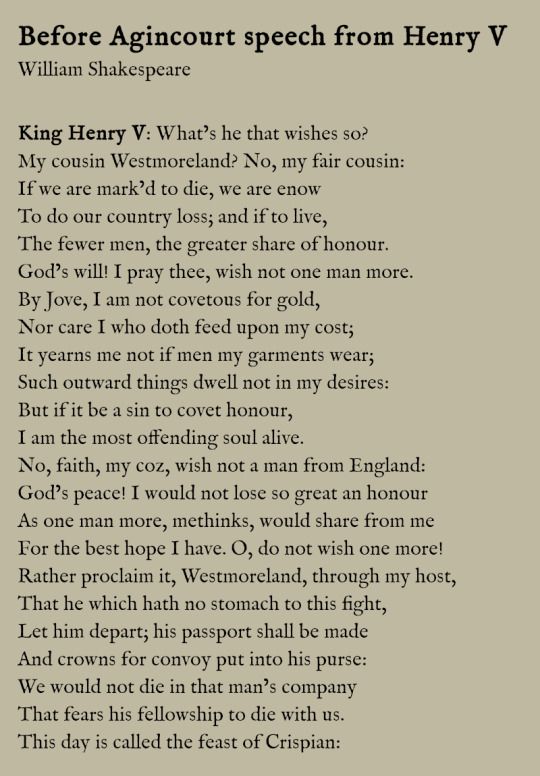

The two poems mentioned were both written by WWI poet Wilfred Owen, famous for his castigation of war and of the madness of that conflict. “Dulce et decorum est” refers to a quote from Roman poet Horace: Dulce et decorum est pro patria mori - "It is sweet and fitting to die for one’s country." This sentiment is the same as that espoused by Henry V in his pre-battle speech, but Owen calls out the idea as inherently false, deriding it as propaganda meant to lure men into a pointless war. In this poem, as in “Anthem for Doomed Youth” and the rest of his war poems, Owen vividly depicts the brutality and misery of war. The lived experience of the soldiers undermined the false promises of a glorious and honorable struggle. The horrors of WWI would forever traumatize an entire generation, and Owen himself would die only one week before the end of the conflict.
As a side note, it is worth mentioning that Owen met poet Siegfried Sassoon while recuperating from shell-shock in 1917, and it is now believed that they were romantically involved despite attempts to straightwash Owen. Sassoon encouraged and helped Owen with his writing, including both poems referenced here, and he was the one who collected and published Owen’s works after his death. (Further reading on the gay war poets.) It's unlikely that Owen's gay relationship with Sassoon was covered in his class, but we know Alex was an extensive reader who pushed outside the boundaries of what he was taught. He could have discovered this information on his own.

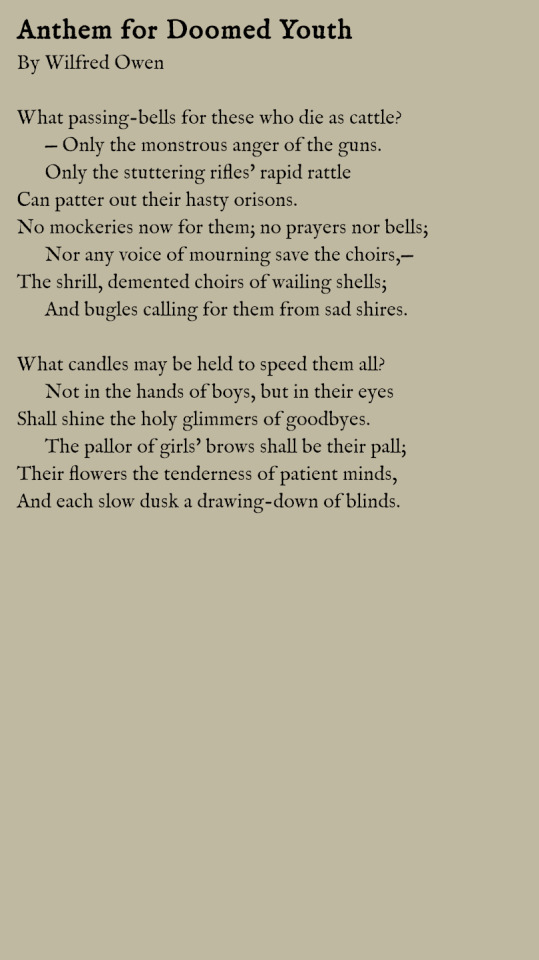
While the comparison itself is extremely common in English lit classes (a quick Google search will show you a number of essays on this exact question), I find it a particularly interesting choice for Alex. As someone who questions authority, rebels against rules, and rejects conventional ideologies, it is fitting that he would be drawn to write an essay examining this conflict between ideal and reality. Knowing as we do his feelings regarding the hypocrisy of the Church and the causes and wars they engage in, one suspects he likely ascribes to the same sentiment as Owen–rejecting the propaganda of patriotism and sacrifice in the service of a Cause sold by those with self-serving interests. I tend to think this character trait is one of the main factors influencing his interactions with Nigel–on one hand, he is reluctant to support any notion of a higher purpose or cause, but on the other, he is intrigued by a cause which paradoxically espouses iconoclasm - attacking or assertively rejecting cherished beliefs and institutions or established values and practices.
As a small side note, both actors' filmographies include WWI movies: Tom Sturridge in Journey's End and Eddie Redmayne in Birdsong. After his starring role in Birdsong, Eddie became interested in WWI and has been involved in projects honoring and remembering those involved in that war. Here's a video on FB of him reading another of Wilfred Owen's poems, "Asleep". I had a past life/WWI AU idea based on the story of Owen (Nigel) and Sassoon (Alex), so discovering this scene was absolutely chef's kiss perfection for me.

[Like Minds Masterpost]
#i love drawing the connections can you tell?#like minds#nigel colbie#alex forbes#tom sturridge#eddie redmayne#murderous intent#like minds 2006#like minds analysis#nigel colbie x alex forbes#like minds au
47 notes
·
View notes
Text
'We few, we happy few, we band of brothers'
It is one thing to disprove and even despise The Shire and its netizens. It is a whole other affair to violently bash S's skills, based on absolutely nothing else than spiteful disappointment.
We are being told by Mordor's basement polymaths the man cannot act. It is probably by an unelucidated strike of luck or by charity that he was cast by *** to embody book boyfriend JAMMF, when he has only 5 (five) known facial expressions in his quiver. He was the weakest link of Season 1 cast: I suppose the BJ/Frank Randall 2-in-1 does have a fan club, after all. His acting is wooden. He has chemistry only with C and by Her grace only, because you know, gay as a bag of popcorn. He is a semi-literate hunk, with documented spelling problems. Even more so, when we conveniently toss aside the mounting hysteria during Quarantein Ha-wa-wee disgrace (hey Pooks and all the sock account Dobermans: I hope you remember your Twitter blaze of glory moment every single morning while brushing your teeth). And (also a favorite) he doesn't read, he doesn't prepare, he is sloppy, like that.
God forbid you'd try to set this colossal unfairness straight. You are automatically signed up to the Mommies for Sam Committee and labeled accordingly. Brainless victim (of what, since he is basically useless, but let's not embarrass ourselves with logic), unapologetic limerent inamorata, romantic whale, delusional rural shipper, conspiracy theory troll. Anything goes, really and we know the tune by heart, at this point in time.
Not so long ago, I was re-watching the oath sequence of (5.01) The Fiery Cross, for which I suppose all background/context is superfluous. The only clip I could find has appalling sound, but should still immediately take you back to the Return of the Kilt (starts at 0:56):
youtube
It immediately reminded me of this:
youtube
This is the extraordinary Henry V Saint Crispin's Day speech. Pure Shakespeare and unmatchable Olivier. It is also a well-documented kamikaze moment of the Battle of Agincourt (1415), when a heavily outnumbered English army defeated in an almost miraculous turn of events the French. Granted, the real speech must have been way more concise, but nevertheless a potent affair, with Henry's cunning use of rumors having it that the French would cut two fingers off each captured archer's right hand, to virtually neutralize them. And his army was, essentially, an army of longbows.
Whatever it was, it worked. It worked so well, that it even gave Winston Churchill the idea of asking Laurence Olivier to broadcast this speech for the BBC some time around 1942 and then make a movie of the whole play, in 1944. Again, context is important -it always is, by the way - and it sheds the right light on Olivier's performance. More than acting, it is damn effective war propaganda, a wonderful patriotic act and completely representative for the "we shall fight them on the beaches and we shall never surrender" spirit. It is also all about acting as summoning of energy: Olivier manages to channel Henry V, he is Henry V and this immediately gives an irresistible depth and truth to his performance.
For contrast, one could compare his version with Branagh's 1989 interpretation (https://youtu.be/y1BhnepZnoo), which I am not adding here for the sake of levity. The main difference is, for me at least, palpable: Olivier completely suppressed his ego, which I am afraid is something impossible to achieve for Branagh. His take on the speech aims to be more modern and natural, and yet it is still all about Branagh promoting his art. And we know it immediately. A fairly honest tableau vivant, but no depth and nowhere near as majestic as the other.
I am not saying here that S is on par with Laurence Olivier. That would really mean being a romantic whale and I am the one you start to get, I hope, acquainted with. What I am saying is that this guy you just love to humiliate and endlessly cackle about every single day God makes, really, deliberately knows what he is doing in there. I would bet handsome money on S carefully watching and re-watching Olivier's Saint Crispin's Day monologue, in order to prepare for that particular scene. The similarities are, to me, evident, as is the consistent hard work and - dare I say it?- massive talent. It's all about owning the scene and being in the moment. And it is arresting, at times.
All of this is not exactly some shipper far-fetched speculation. S wrote, after all, in Waypoints (and the reference is way too spot on to believe in a kind gesture of the ghostwriter) that he "devoured"

I see great things. I see a very gifted guy who has no ego (C was spot on and for an actor, that is a blessing) and also probably no idea of his (considerable) acting range. I also see a guy who, spare for OL, has been grossly, unfairly miscast and overlooked. And who was determined to take whatever was available or easy on the schedule, in order to remain relevant. I may not be a good client for his booze, but I would pay handsomely to see him in something along the lines of For Whom The Bell Tolls. Or even (if you want a more exotic but oh, so rewarding alternative) a still inexplicably missing Western adaptation of Bulgakov's Master and Margarita (probably not the best times for that one, but still: Bulgakov was, after all, born in Kyiv and not really a fan, to say the least, of tyrants). That's exactly how damn good he is.
How was it, Kidneystone BIF? Oh. "No boundaries. No respect. No class." Exactly, madam. You said it yourself.
88 notes
·
View notes
Note
This isn't the first time I've read this. I'd be interested to know what you think. This is pure propaganda and much deeper than we think. Some powerful groups want the monarchy to be abolished. They want William gone. Maybe it's to launch the new world order. Look at the seed they are trying to sow through the media. Meghan is just a pawn in a bigger plan. Getting rid of the monarchy means getting rid of stability to implement the change they want, they could then weaken other governments. 🌹
This will be my quarter of an hour of truth:
There is no global force that wants the United Kingdom to lose, there is no chance that the United Kingdom will become a republic! why the British are not the French. France has a better chance of having a 6th republic and a 4th revolution in the next 30 years. Even Russia is not trying to overthrow the United Kingdom because it is too busy with its attacks in Eastern Europe.
The USA is currently divided in two and therefore too busy on its own. The global south is in the midst of a revolution to attract the global economy so there is not enough time to try to overthrow William.
There is a new global organization but it has nothing to do with Prince William, it's just economic, technological and environmental (I remind you that in the global south there are monarchies!!!)
The truth is that William is not ready for office, being ready to be King is not about making beautiful children and taking beautiful photos.
William's problem is that he does not want to follow the line of King George 6, nor Queen Elizabeth 2 and even less of Charles (because he is someone who wants to kill his son since birth according to some people here)
This is not the first time that William has made mistakes, he threw his godmother under the bus while Buckingham Palace was already investigating because there were already different versions now we know the truth!
William does not have a cool head, he reigns with his ego and his emotions which can take on completely crazy proportions.
He is not aware (because he does not read the foreign press like the Queen and Charles) of the changes taking place worldwide.
He just gets scared of tweets on Twitter like Omid and dr shola I don't know what…. YES they make a lot of noise on Twitter but neither of them are capable of selling books in the real world!!! conclusion Twitter is an epiphenomenon.
Yes the social networks are going crazy about Catherine we went to a cosmetic operation on the nose then on the buttocks for William to a mistress who is pregnant and who came to see Catherine at Christmas
(I don't know if young people realize their stupidity, at Christmas she was with Charles, yes!!!)
William must put together a real team to help him in his role and not protect his private life.
If we were to listen to William, as armies, we should stop inspecting the armies in African countries because it's colonial lol lol all heads of state around the world inspect their army and hi to the other armies it's is tradition! (this sentence definitely comes from him!!!)
Your guy is so afraid of everything that he doesn't even understand the meaning of these sentences and the impact they can have. Fortunately the United Kingdom is a parliamentary monarchy so there is power to put things in their place.
If this story of Catherine made the journalists/reporters in the foreign policy section frown, it is because there is a good reason.
I can continue like this except that here on this forum as soon as we highlight certain things, the only answer is you have been a fan of Charles since the beginning you hate William bla bla
For your information, these two have no impact on my life.
44 notes
·
View notes
Text
Botanic Tournament : Honorary Mentions !
This is a bracket made with rejected submissions. Here they're legit.
Explanations here
Round 2 Part 1 Poll 1


Explanations underneath
Chocola(t) Meilleure (meilleure is the feminine form for the adjective "better" in French) is one of the two main characters from a magical girl manga turned anime known as Sugar Sugar Rune in English. The other protagonist is Vanilla Mieux (mieux means best in French), her best friend with opposite looks and personality). It seems her name is sometimes written Chocolat (which does mean chocolate in French, with a silent "t") and sometimes Chocola (which I think I saw it several times on French covers and I believe it's the writing used in the French version)
From her original submitter : "I don't know if chocolate is close enough to a plant name but Chocola is my favourite character from this anime so I wanted to at least try to submit her"
As a pollrunner, I hesitated a bit when I saw that another family member was -at least occasionally- named Pepper and that her Mom was called Cinnamon since it shows an intention... but nevertheless I'd refused characters for less and chocolate is manufactured. I would have accepted Cacao/Cocoa.
In reply to the original submitter : I'd looked and no, the cabbage man didn't have a name when you submitted him. However, I had another look just in case recently... and it looks like he's going to be known as Cai in the children book focused on him that should go out this Summer. According to the wiki, "if he shares the same last name as his son Lau Gan-Lan, That would make his name "Cai Gan-Lan", a play on "gan-lan cai", the name of a vegetable dish."
Here was the original propaganda : "he is a cultural icon and you know him even if you haven't seen atla just through the power of internet osmosis (me im the example)"
#botanic tournament#tournament polls#honorary mentions bracket#chocola meilleure#chocolat meilleure#sugar sugar rune#mangablr#animeblr#cabbage man#cabbage merchant#the cabbage merchant#atla#avatar the last airbender#avatar the last airbenber netflix#atla netflix#atla movie#atla series#atla show
15 notes
·
View notes
Text
This is interesting info about languages Elizabeth of York spoke


This is excerpt from Most pleasant song of lady Bessy, and it is the part where Bessy(Elizabeth of York) manages to convince Lord Stanley to betray Richard and to contact Henry Tudor.
But he is scared, he thinks he cannot trust any scribe to write essentially treason. But Elizabeth turns around and says-oh I can write the letter. My father had me and my sister Cecily taught by a man from London. I can write well, in both English and French, and SPANISH!
(It is bit strange that the poem doesnt mention Latin, though correspondence from late 1490s strongly suggest Elizabeth knew Latin grammar too. But, we cannot rule out she learnt later than 1484/5. Or maybe she wasnt very good yet in that time and later gained confidence. )
However Bessy knowing Old Spanish/Castilian would make sense if she was intended to wed to Iberian peninsula. But we only ever hear about Richard III intending to wed her to Portuguese royal family. His reign is too short time for her to learn the languaeg.
I never heard that there were any plans to marry her to Spain specifically. But maybe as with Catherine of Aragon learning French to use at English court, maybe Elizabeth of York was learning Spanish to use at Portuguese court. Because it would make things easier for her at least a bit.
If it was true it might have indicate Edward IV already intended her for Portugal.
It is bit weird that the matter(her spanish) didnt get brought up later. If Elizabeth of York was confident enough to write in Spanish, why not write to spanish royals in her own hand in Spanish? Why not converse with Catherine of Aragon in Spanish? Could it simply not get into records?
It is but strange that only spanish wikipedia mentions Elizabeth's education. As source there is book Elizabeth of York by Arlene Okerlund.
But this what it says on their wiki:
When she was bethrohed to dauphin, her father arranged her to have language tutors from France, Italy and Spain.
Although she spoke French, it was not fluently.
(-yeah, in comparison to Henry VII probably not. He was master level.)
Schollars from Oxford taught her classics and experts in calligraphy(handwritting) from Scriptoria at Westminster Abbey instructed her. In other words she had greater education than most men in 15th century(except those ment for church), let alone a woman.
She was also instructed to read and write in English, learnt math, household management, embroidery or sewing, horse-riding, music, and dancing.
You know on first glance it looks overexagerated, but it would make sense given how educated Henry VIII was and his upbringing was mostly dedided by his mother.
If she was so well-educated as woman, it would make sense her son got even better education.
I know the poem might be propaganda. Just sneaking out to meet Stanley in private, would be very difficult. Although if both were at court...maybe. Elizabeth seems to have been given greater deal of freedom by Richard at court, than you would expect. Considering the man had her mother proclaimed whore, Elizabeth and her siblings bastards, and her brothers "dissappeared" in his "care".
But still it was originally written in late 15th century, likely after 1487/8 when Cecily became lady Welles. (First surviving written versions are from c.1600, it was passed on orally it seems-it was a song.) But i dont think we can just throw it away.
But we aware that part of the poem is Elizabeth pleading is her telling Stanley her uncle was making plans to poison his own wife and son.(Which if true, would mean he was starking mad.)
-But it might be that part of the poem is true and part is propaganda.
But the poem is wonderfully written and the dialogs are so logical.
Elizabeth keeps trying to remind Stanley that his titles, lands were given to him by her father and that Richard had no right to the throne, that her brothers disappeared and were not even buried in any sacred ground, that Richard got rid of his original supporters and he might well get rid of Stanley after his usefullness expires.
And he keeps telling her no, there is no real support for anybody else and thinks overthrowing him are foolish dreams etc.
But she keeps going. And revealing more. And big part of it is her saying her uncle wants her to come to his chamber and be his love and wife. And she is extremely oposed to the idea. I mean she lists all the suffering she would rather endure...than to come to her uncle's chamber.
Towards end of her pleading, when Stanley keeps rejecting to help her and wants her to leave, she starts crying, she throws away her headwear and says they will find her body in Thames, where she will drown, her bones shall lay on sand, fishes will feed upon her and that will be her destiny.
And that is what breaks Stanley.
There is of course more-it is very long poem. But I get why currently with the Ricardians trying to restore Richards image this is not being spread around. Because this was probbaly major inspiration source behind Shakespear's Richard III.
-of course it is entirely possible this part of poem is overexagerating/lying. Perhaps other parts too.
Tell me what you think, do you think it is possible she spoke Spanish?
16 notes
·
View notes